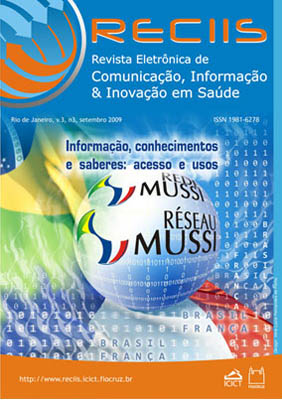Information literacy for community health agent training in Brazil: a proposal for mediation based on the extensive and collaborative models
DOI:
https://doi.org/10.3395/reciis.v3i3.757Keywords:
Extensive communication, information literacy, mediation, subjects of learning, community health agentsAbstract
This article presents methodology based on the extensive communication model (SIMEÃO, 2006) and Alfin, an acronym published by Unesco to offer a concept for the process of information literacy acquisition (information literacy), in research applied to the communication context of information on health in Brazil. This paper assesses the mediation of Community Health Agents (ACS) in their work in the Brazilian Unified Health System (SUS) through the development of Alfin training workshops. In testing whether the proposal is applicable in a professional workspace which is more open, with more informal communication relationships, the research group observes the Community Health Agent (ACS), a supporting professional and the main mediator in the Family Health Care Program, and his/her performance as a communicator. The hypothesis is based on the following proposition: once trained by specialists in the fields of technology, information and communication, the ACS will be able to act as mediators with a broader view in terms of communication. The study also aims to identify the sources of information used by the ACS and the perspectives of expanding such sources after training in the Alfin workshops. The content produced in the workshops will also be a subject of study and of theory and methodology discussions; this contributes to broadening the proposition of the extensive communication model.Downloads
Published
How to Cite
Issue
Section
License
Author’s rights: The author retains unrestricted rights over his work.
Rights to reuse: Reciis adopts the Creative Commons License, CC BY-NC non-commercial attribution according to the Policy on Open Access to Knowledge by Oswaldo Cruz Foundation. With this license, access, download, copy, print, share, reuse, and distribution of articles is allowed, provided that it is for non-commercial use and with source citation, granting proper authorship credits and reference to Reciis. In such cases, no permission is required from the authors or editors.
Rights of authors’s deposit / self-archiving: The authors are encouraged to deposit the published version, along with the link of their article in Reciis, in institutional repositories.












